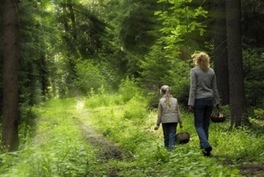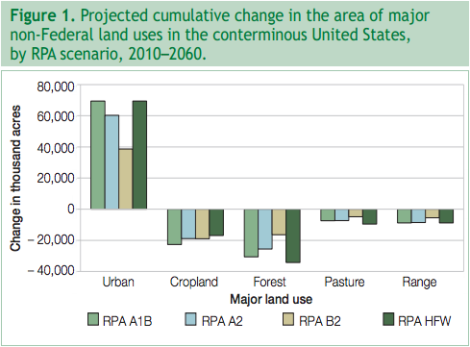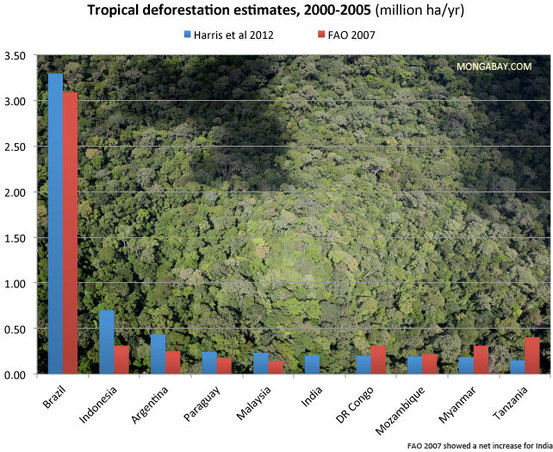Forests
|
Navigation
As much as 80% of the world's forests have been degraded or destroyed. Learn more. According to the U.S. Forest Service report, “Future of America’s Forests and Rangelands", the U.S. could lose 34 million acres of forest by 2060 with urban and developed land expected to increase between 41-77% by 2060.
|

Forests are home to 300 million people worldwide and 80% of the world's terrestrial biodiversity and provide direct livelihoods for 1.6 billion people, including the 10 million people who work in forest management and conservation. According to FAO, the world's total forest area is just over 4 billion hectares, with forests covering 31% of total land area and legally established protected areas covering an estimated 13% of the world’s forests. The five most forest-rich countries, the Russian Federation, Brazil, Canada, the United States of America and China, account for more than half of the total forest area. Although more than half of all animal and plant species in the world live in tropical forests and despite the abundant benefits forests provide to humanity, such as maintaining a balanced climate by regulating atmospheric gases, stabilizing rainfall and protecting against desertification, as much as 80% of the world's forests have been degraded or destroyed and every day we are losing at least 80,000 acres of forest and at least another 80,000 acres are being degraded. Forests worldwide are nearing a tipping-point brought on by drought and exacerbated by climate change and deforestation. Rainforests once covered 14% of the Earth's land surface, now they cover a bare 6% and experts estimate that the last remaining rainforests could be consumed in less than 40 years and certainly by the end of the century at the current rate of deforestation. Nearly half of the world's species of plants, animals, insects and microorganisms will be severely threatened or destroyed over the next quarter century due to deforestation. One and one-half acres of rainforest are lost every second and experts estimate that we are losing 137 plant, animal and insect species every day due to deforestation, which equates to 50,000 species a year. Although FAO estimates that compared to the 1990's, the rate of deforestation was slightly lower this past decade at a rate of 13 million hectares of forest being destroyed annually, which is an area about the size of Greece, and planted forests now comprise nearly 7% of total forest area, each year the world has less forested area, and the forests that remain are of lower quality. For example, when a monoculture of an exotic species replaces an old growth forest, there is a great reduction of biodiversity and consequently, ecosystem services. As Lester Brown, the President of the Earth Policy Institute states, "Global rates of deforestation do not capture the full damage done to the world’s forests. Forest degradation from selective logging, road construction, climate change, or other means compromises the health of remaining forests." Moreover, big, old trees are in decline around the world, which are essential to the health of the forest by doing many things that smaller, younger trees cannot, such as providing homes for many types of animals, providing space for other plants to grow in tropical rainforests and producing large amounts of seeds that serve as food for other animals and replenish tree populations. According to Greenpeace, "The importance of forests stretches far beyond their own boundaries. Forests help to regulate the Earth's climate because they store nearly 300 billion tonnes of carbon in their living parts - roughly 40 times the annual greenhouse gas emissions from fossil fuels. When they're destroyed through logging or burning, this carbon is released into the atmosphere as the climate changing greenhouse gas, carbon dioxide. The destruction of forests is responsible for up to a fifth of the world's greenhouse gas emissions - more than every plane, car, truck, ship and train on the planet combined. Forests also regulate water flow and rainfall so we depend on them to grow our crops and food. The loss of forest in one part of the world can have severe impacts in another; forest loss in Amazonia and Central Africa can severely reduce rainfall in the USA Midwest, for example." Learn more.
|
"Forests cover one third of the earth's land mass, performing vital functions around the world. In fact, 1.6 billion people depend on forests for their livelihoods. They play a key role in our battle against climate change. Forests feed our rivers and are essential to supplying the water for nearly 50% of our largest cities, including New York, Jakarta and Caracas. They help to regulate the often devastating impact of storms and floods. Forests are the most biologically-diverse ecosystems on land, home to more than half of the terrestrial species of animals, plants and insects. Forests also provide shelter, jobs and security for forest-dependent populations. Yet despite all of these priceless ecological, economic, social and health benefits, we are destroying the very forests we need to survive. Global deforestation continues at an alarming rate -- 13 million hectares of forest are destroyed annually, equal to the size of Portugal. But it's not too late to transform business as usual into a future where forests are at the heart of our sustainable development and green economies. An investment of US$30 billion fighting deforestation could provide a return of US$2.5 trillion in saved products and services. Furthermore, targeted investments in forestry could generate up to millions of jobs around the world." ~UNEP
|
|
Overview of Deforestation Around the World
|
According to UNFCCC, subsistence farming is responsible for 48% of deforestation; commercial agriculture is responsible for 32% of deforestation; logging is responsible for 14% of deforestation and fuel wood removals make up 5% of deforestation. According to FAO, "Most of the losses in forest cover are taking place in developing countries, in particular in South America, Africa and Southeast Asia. One of the root causes behind deforestation is the weak governance structure for forest conservation and sustainable management of forest resources. This applies particularly to publicly owned forests that represent over 80 percent of global forest cover." |
|
According to the U.S. Forest Service's report, "Future of America's Forests and Rangelands," expanding residential and industrial areas will combine with climate change to wipe out an enormous amount of forested land in the U.S. by 2060 - an estimated 34 million acres of forest. |
The world's established forests remove 8.8 billion tons of CO2 from the atmosphere annually, which equates to nearly one third of all annual fossil fuel emissions from humans. View Study.
|
|
|
WWF Living Forests Report: Chapter 1 - Forests for a Living Planet
Your browser does not support viewing this document. Click here to download the document.
WWF Living Forests Report: Chapter 3 - Forests and Climate
Your browser does not support viewing this document. Click here to download the document.
|
WWF Living Forests Report: Chapter 2 - Forests and Energy
Your browser does not support viewing this document. Click here to download the document.
WWF Living Forests Report: Chapter 4 - Forests and Wood Products
Your browser does not support viewing this document. Click here to download the document.
|
A U.S. Forest Service analysis of 20 U.S. cities concludes urban tree loss at about 4 million trees a year. This translates into an astronomical annual loss in environmental services, such as reduced heating and cooling costs, when you consider that each tree represents as much as $2,500 in such services during a its lifetime, which is a return rate three times greater than tree care costs. Urban tree loss could be costing tax payers billions of dollars. Learn more.
via chartsbin.com
"The disappearance of forests poses a serious threat to our survival. Forests play an important role in our planet’s ecosystem. They are homes to millions of species of wild plants and animals and play an important role in absorbing greenhouse gases. During the last century, the world lost over 80 percent of its original forests. Every day, approximately 375 square kilometers of forest are lost." ~United Nations Environment Programme
|
|
|
Last Revised: 11/20/13
Commenting Rules |






